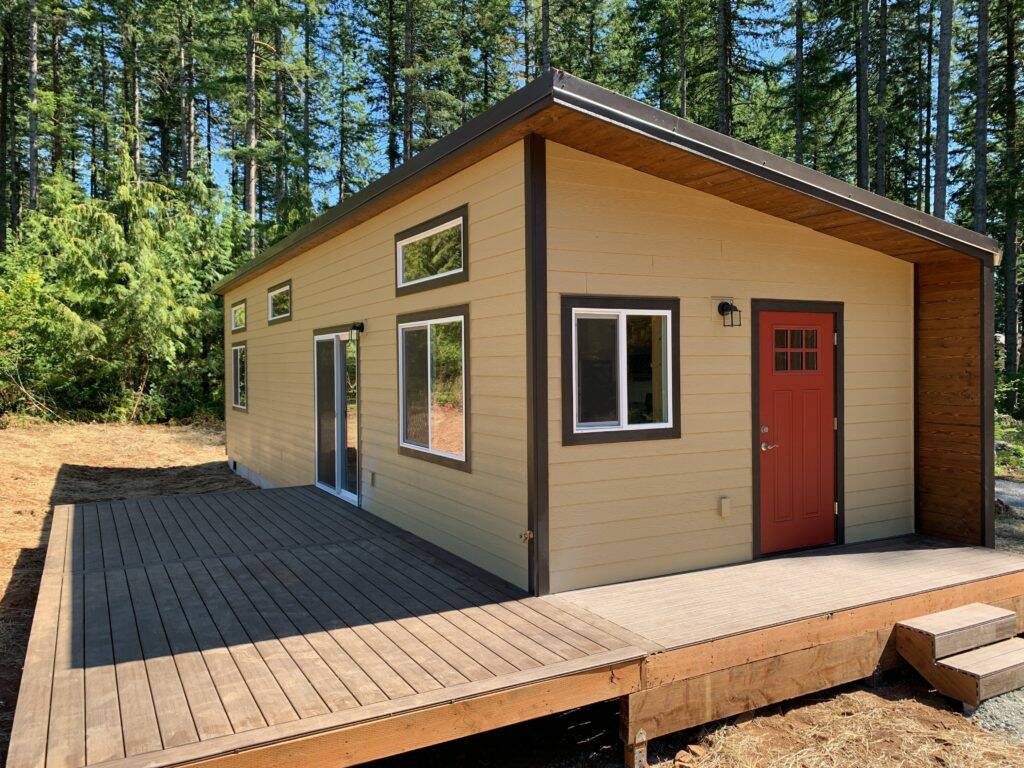Part of the solution to the housing affordability crisis could be building homes in a factory and shipping them rather than building on the land itself.
With recent investments from the state and county, the Coastal Community Action Program, the local coordinated entry agency, is working to bring dozens of these units — modular homes — into Grays Harbor County as affordable housing.
In the next few months, 24 modular homes could be serviceable in Aberdeen and another 12 elsewhere in the county by the end of the year, tailored as permanent supportive housing for people who might otherwise be homeless.
The Aberdeen project has been in the works since pre-pandemic, said Craig Dublanko, CEO of the Coastal Community Action Program.
“It’s been a long time coming,” Dublanko said.
After a local working group identified modular housing, or prefabricated construction, as a tool to increase affordable housing, CCAP responded to a state request for proposals for groups interested in building modular housing projects. The project was delayed by pandemic holdups, and CCAP was forced to search for another company to manufacture the homes after an initial partner went bankrupt.
Dublanko said CCAP is in the queue this spring to have the units built and shipped to Aberdeen. The houses — six four-plexs — will be distributed among three pieces of land. Dublanko hopes they will be online by this summer.
As that project nears culmination, it coincides with a similar effort to supply more units outside the central harbor.
The Grays Harbor County Board of Commissioners on Tuesday named CCAP as a successful applicant for $500,000 in American Rescue Plan Act funding contract for the purchase and installation of four modular units. The contract mandates the project must serve rural areas outside the “urban core” of the county.
CCAP will use the half million dollars, along with $2.4 million it received last year through the Washington State Department of Commerce, to develop eight other units outside of the urban core, according to Kimberly Stoll-French, housing and community services director with CCAP.
That money comes through the Apple Health and Homes program, which was created by the state Legislature in 2022. The program pairs supportive housing services with health services provided through the state Health Care Authority, setting up narrower eligibility parameters, like income below a certain threshold, behavioral health needs and history of homelessness.
People using the Apple Health program can also receive rent assistance. Because the housing is “permanent,” there is no time limit on tenant stays.
The funding will pay for the entire project, from a land purchase to buying the homes themselves.
CCAP has partnered with Wolf Industries, Inc., a tiny home manufacturer based in Battle Ground, to construct the houses. According to the company, construction and inspection occurs at the facility over the course of three to four weeks.
“They’re beautiful, very modern looking,” Stoll-French said. “The whole idea is to make sure that they fit into the neighborhoods. We want to add to the community.”
Proponents say that by streamlining permitting and active construction, offsite building can produce houses 20-50% faster than traditional methods.
The state Department of Commerce estimates Washington will need 1.1 million new homes in the next 20 years to keep up with demand, and more than half of those will need to be affordable at the lowest income levels. Grays Harbor County will need about 36,000 new units in that same time frame, with a little more than one-third of the units accessible to people who make less than half of the Area Median Income, according to projections from Commerce.
“Smaller projects, like a modular project, have the potential to bring more units online for the amount of money that we have,” said Cassie Lentz, housing program manager with Grays Harbor County Public Health.
The county has also worked previously on tiny home projects.
CCAP expects to have the rural modular units occupied by the end of the year, according to a timeline provided to the health department. The agency is still searching for a place to put the modular units.
Dublanko said that while he is “excited” to get 36 new units online, CCAP alone will not be able to supply the amount of affordable housing needed.
“Every new unit that comes online is going to help the situation,” Dublanko said. “We need more units all the way around in this community.”
Contact reporter Clayton Franke at 406-552-3917 or clayton.franke@thedailyworld.com.


